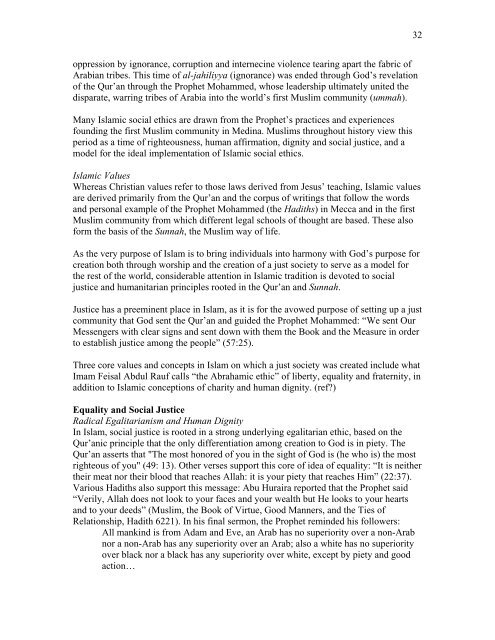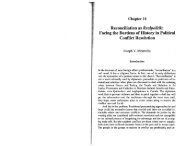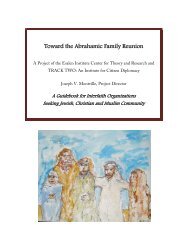The Ethics and Pro-Social Values in Judaism, Christianity and Islam ...
The Ethics and Pro-Social Values in Judaism, Christianity and Islam ...
The Ethics and Pro-Social Values in Judaism, Christianity and Islam ...
Create successful ePaper yourself
Turn your PDF publications into a flip-book with our unique Google optimized e-Paper software.
32<br />
oppression by ignorance, corruption <strong>and</strong> <strong>in</strong>ternec<strong>in</strong>e violence tear<strong>in</strong>g apart the fabric of<br />
Arabian tribes. This time of al-jahiliyya (ignorance) was ended through God’s revelation<br />
of the Qur’an through the <strong>Pro</strong>phet Mohammed, whose leadership ultimately united the<br />
disparate, warr<strong>in</strong>g tribes of Arabia <strong>in</strong>to the world’s first Muslim community (ummah).<br />
Many <strong>Islam</strong>ic social ethics are drawn from the <strong>Pro</strong>phet’s practices <strong>and</strong> experiences<br />
found<strong>in</strong>g the first Muslim community <strong>in</strong> Med<strong>in</strong>a. Muslims throughout history view this<br />
period as a time of righteousness, human affirmation, dignity <strong>and</strong> social justice, <strong>and</strong> a<br />
model for the ideal implementation of <strong>Islam</strong>ic social ethics.<br />
<strong>Islam</strong>ic <strong>Values</strong><br />
Whereas Christian values refer to those laws derived from Jesus’ teach<strong>in</strong>g, <strong>Islam</strong>ic values<br />
are derived primarily from the Qur’an <strong>and</strong> the corpus of writ<strong>in</strong>gs that follow the words<br />
<strong>and</strong> personal example of the <strong>Pro</strong>phet Mohammed (the Hadiths) <strong>in</strong> Mecca <strong>and</strong> <strong>in</strong> the first<br />
Muslim community from which different legal schools of thought are based. <strong>The</strong>se also<br />
form the basis of the Sunnah, the Muslim way of life.<br />
As the very purpose of <strong>Islam</strong> is to br<strong>in</strong>g <strong>in</strong>dividuals <strong>in</strong>to harmony with God’s purpose for<br />
creation both through worship <strong>and</strong> the creation of a just society to serve as a model for<br />
the rest of the world, considerable attention <strong>in</strong> <strong>Islam</strong>ic tradition is devoted to social<br />
justice <strong>and</strong> humanitarian pr<strong>in</strong>ciples rooted <strong>in</strong> the Qur’an <strong>and</strong> Sunnah.<br />
Justice has a preem<strong>in</strong>ent place <strong>in</strong> <strong>Islam</strong>, as it is for the avowed purpose of sett<strong>in</strong>g up a just<br />
community that God sent the Qur’an <strong>and</strong> guided the <strong>Pro</strong>phet Mohammed: “We sent Our<br />
Messengers with clear signs <strong>and</strong> sent down with them the Book <strong>and</strong> the Measure <strong>in</strong> order<br />
to establish justice among the people” (57:25).<br />
Three core values <strong>and</strong> concepts <strong>in</strong> <strong>Islam</strong> on which a just society was created <strong>in</strong>clude what<br />
Imam Feisal Abdul Rauf calls “the Abrahamic ethic” of liberty, equality <strong>and</strong> fraternity, <strong>in</strong><br />
addition to <strong>Islam</strong>ic conceptions of charity <strong>and</strong> human dignity. (ref?)<br />
Equality <strong>and</strong> <strong>Social</strong> Justice<br />
Radical Egalitarianism <strong>and</strong> Human Dignity<br />
In <strong>Islam</strong>, social justice is rooted <strong>in</strong> a strong underly<strong>in</strong>g egalitarian ethic, based on the<br />
Qur’anic pr<strong>in</strong>ciple that the only differentiation among creation to God is <strong>in</strong> piety. <strong>The</strong><br />
Qur’an asserts that "<strong>The</strong> most honored of you <strong>in</strong> the sight of God is (he who is) the most<br />
righteous of you" (49: 13). Other verses support this core of idea of equality: “It is neither<br />
their meat nor their blood that reaches Allah: it is your piety that reaches Him” (22:37).<br />
Various Hadiths also support this message: Abu Huraira reported that the <strong>Pro</strong>phet said<br />
“Verily, Allah does not look to your faces <strong>and</strong> your wealth but He looks to your hearts<br />
<strong>and</strong> to your deeds” (Muslim, the Book of Virtue, Good Manners, <strong>and</strong> the Ties of<br />
Relationship, Hadith 6221). In his f<strong>in</strong>al sermon, the <strong>Pro</strong>phet rem<strong>in</strong>ded his followers:<br />
All mank<strong>in</strong>d is from Adam <strong>and</strong> Eve, an Arab has no superiority over a non-Arab<br />
nor a non-Arab has any superiority over an Arab; also a white has no superiority<br />
over black nor a black has any superiority over white, except by piety <strong>and</strong> good<br />
action…




